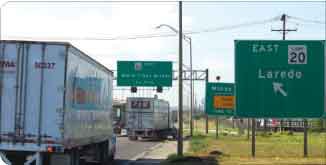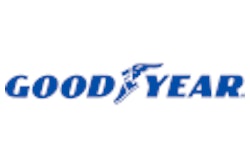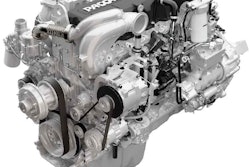Capacity shortfall forecast into 2013
A combination of the trucking industry trying to catch up with the economic recovery and adapting to government regulations that are still being developed will extend a capacity shortage through 2013, a trucking economist said at an online seminar Feb. 10.
 FTR analysts foresee double-digit percentage increase in driver pay.
FTR analysts foresee double-digit percentage increase in driver pay.The shortfall will peak above 250,000 units in 2012 but continue at about 150,000 units in 2013, predicted Noel Perry, a senior consultant with FTR Associates and principal of Transportation Fundamentals. He said the industry is pursuing productivity increases through greater utilization of existing equipment, and miles per tractor were up more than 10 percent in 2010. Without that productivity improvement, “this crisis could be twice as bad, peaking at around 400,000 units,” he said.
Perry added that capacity utilization has recovered to above 90 percent, but rate increases haven’t kept pace. He said carriers are more productive and profitable, without increasing rates much. “From now on if a [carrier] wants to handle more freight, he is going to have to hire drivers and buy equipment,” he said.
Asked about the proposed hours of service changes and their impact on trucking, Perry predicted driving hours will be cut to 10 from 11. “We figure it’s going to cost the industry about 5 percent in productivity,” he said.
In response to a question, Perry projected that driver pay will increase by double digits in the second half of 2011 and continue “for at least another year.”
Perry forecast a 5 percent tonnage increase in 2011. He added that gross domestic product growth will be in the 3 percent range for the year, led by manufacturing and an improving retail market.
Larry Gross, an FTR senior consultant, said that rail and intermodal shipments were slowed during recent bad weather but will rebound in the next few months. Perry added that shipper demand will pick up and trucking also will recover from the weather slowdown.
— Max Kvidera
SHORT HAULS
JANUARY CLASS 8 truck total net orders for all major North American truck makers increased 1 percent over December to 27,009 units, according to FTR Associates. The order level is more than four times the figure in January 2010.
SPOT MARKET truckload freight movement in December increased 55 percent over a year earlier, according to TransCore’s North American Freight Index. TransCore said spot market freight volumes for the third and fourth quarters in 2010 were the highest since 2005, a peak year for spot market volume.
TRUCKING COMPANIES added 3,200 new employees on a seasonally adjusted basis in January, the U.S. Department of Labor’s Bureau of Labor Statistics reported.
FREIGHT MOVEMENT as measured by the Freight Transportation Services Index rose 1.5 percent in December from November, the U.S. Department of Transportation reports. December’s figure was 0.4 percent higher than a year earlier. In 2010, the index increased 0.4 percent.
NAFTA SURFACE TRADE between the United States and Canada and Mexico rose 15.5 percent in November 2010 over November 2009, according to the U.S. Department of Transportation.
NET COMMERCIAL TRAILER orders rose to 22,915 in December, a 7 percent increase over November, ACT Research Co. says. ACT also reports December factory shipments were up 12 percent from November and 69 percent higher than December 2009.
Trucker wins inspection case
A federal judge has ruled the Minnesota State Patrol’s conduct during a 2008 fatigue inspection violated a trucker’s Fourth Amendment rights against unreasonable search and seizure.
In May 2008, officers pulled over Stephen K. House, owner of Eagle Trucking Enterprises, for a Commercial Vehicle Safety Alliance Level III inspection during a FIST patrol event. FIST is an acronym for fatigue impairment, seatbelt violations, and other traffic violations, which are checked most often at inspections at weigh stations.
Patrol officers made inquiries regarding House’s neck size, urination habits, financial affairs, allergies and family illnesses, according to the suit. Officers also asked if he had specific items in his cab, including Playboy magazines, food wrappers, food and a computer.
Law enforcement placed House, a trucker of 32 years with at least 3 million accident-free miles, out of service for 10 hours. The Owner-Operator Independent Drivers Association and House consequently filed suit.
On Jan. 28, Judge Donovan Frank, U.S. District of Minnesota, ruled the defendants’ investigation exceeded what the law entitles.
The parties were set to meet March 2 to mediate prospective remedies. Frank ordered House’s out of service record wiped clean, and OOIDA and House are also entitled to an award of attorney fees and costs.
– Jill Dunn
Congress mulls tax form’s impact
The U.S. House Small Business heard testimony Feb. 9 on a new tax requirement the Owner-Operator Independent Drivers Association says will burden its members, while Congress examines legislation to repeal it.
 Congressional bills are aimed at repealing an IRS plan to require small business owners to file more Form 1099s.
Congressional bills are aimed at repealing an IRS plan to require small business owners to file more Form 1099s.Committee Chairman Sam Graves (R-Mo.) said the hearing, “Buried in Paperwork: A 1099 Update,” examined the expanded 1099 reporting requirements in Section 9006 of the Patient Protection and Affordable Care Act.
The impending rule would require companies to file a Form 1099 on every business with which they spend at least $600 a year.
Small business owners testified on the toll it would take for them in money and time. Rep. Daniel Lungren (R-Calif.), who is sponsoring one of the legislative efforts to repeal it, also testified. His bill, the Small Business Paperwork Mandate Elimination Act or H.R.4, was referred to committee Jan. 12 and has 270 sponsors.
Testimony submitted by Todd Spencer, OOIDA executive vice president, says a one-truck owner-operator will make at least 100 fuel purchases for $600 from 50 or more fuel vendors in a year. Owner-operators also deal with many businesses for equipment maintenance, with each purchase usually exceeding $600.
Some bills with the goal of eliminating the new rule have been introduced.
— Staff reports
Highway Hero finalists named
Four finalists have been named for the 28th annual Goodyear North America Highway Hero Award.
Truckers Jaime Avitia, of El Paso, Texas; Tilden Curl, of Olympia, Wash.; Bill Howard, of Litchfield, Neb.; and David Nelson, of Orlando, Fla., were selected for the heroism award.
“This program offers an opportunity for recognition of those who put their lives on the line to help others,” said Joseph Copeland, vice president for commercial tire systems for The Goodyear Tire & Rubber Co.
The winner will be announced March 31 in Louisville, Ky., and will receive a $10,000 U.S. Savings Bond, a plaque and a specially designed ring. The other finalists will receive a $5,000 U.S. Savings Bond and plaque.
— Staff reports
Cross-border talks progress
U.S. Secretary of State Hillary Rodham Clinton met with her Mexican counterparts in Mexico in January to discuss implementing a cross-border trucking program.
 Government officials and business executives have held talks to revive a cross-border trucking program with Mexico.
Government officials and business executives have held talks to revive a cross-border trucking program with Mexico.In a Jan. 24 press conference, Clinton said she and Patricia Espinosa, Mexico’s foreign secretary, have reviewed methods of inspecting and clearing legitimate goods away from border stations.
“We are working with our counterparts in each of our governments to create trucking policies that reduce transit costs and enhance safety,” she said.
On Jan. 12, U.S. Transportation Secretary Ray LaHood joined Trade Representative Ron Kirk for cross-border trucking discussions at the third annual Labor Advisory Committee for Trade Negotiations and Trade Policy. The trade representative and the labor department lead the LAC, which comprises 30 U.S. union representatives.
The day before, U.S. Sen. Patty Murray called Mexico’s plans to continue the 99 tariffs on U.S. goods “deeply unfair.” It imposed the measure when Congress voted to end its cross-border trucking program with the nation nearly two years ago. “The United States put a proposal on the table, and Mexico should have responded by ending all punitive tariffs immediately,” the Washington Democrat said.
Mexico has said it will not add additional retaliatory tariffs on U.S. goods, Murray noted.
Also in January, the U.S. Chamber of Commerce led a two-day trade delegation to Mexico City. It said it would press for a “mutually agreeable solution” in the debate over cross-border trucking with Mexico.
— Jill Dunn
Detention time bill filed
Representative Peter DeFazio (D-Ore.) Feb. 17 introduced legislation that directs the U.S. Department of Transportation to study how much time truckers are forced to wait at loading docks and to use those study results to establish a maximum number of hours drivers may be detained without compensation.
“I asked (Government Accountability Office) GAO to study detention time and quantify the results. It’s clear from the report that detaining truckers at loading docks is a significant problem that FMCSA (Federal Motor Carrier Safety Administration) needs to regulate,” DeFazio said.
The legislation, H.R. 756, would require shippers and receivers to pay a fee for detention of drivers beyond the time established by USDOT and authorize civil penalties against shippers for failure to pay for unreasonable detention time.
A 2009 study conducted by the FMCSA calculated that waiting for loading and unloading cost carriers over $3 billion annually.
Through driver interviews, the GAO found that detention time affects drivers’ ability to make a living, has an impact on hours-of-service and hampers owner-operators more than company drivers.
The Owner-Operator Independent Drivers Association said the bill would make shippers and receivers accountable for their role in hampering productivity in the transportation supply chain.
OOIDA said its surveys indicate as many as 40 hours per week are spent by drivers waiting to be loaded or unloaded.
— Staff reports
TCA names 20 top fleets
The Truckload Carriers Association and CarriersEdge have named 20 North American for-hire trucking companies as winners of the 2011 Best Fleets to Drive For contest.
Company drivers and owner-operators were asked to nominate carriers that operate 10 trucks or more. CarriersEdge interviewed human resources representatives and executives of the nominated fleets about their corporate direction, policies and programs. Nominated fleets were evaluated in areas such compensation packages, health benefits, career path and advancement opportunities, and annual driver turnover rate.
Those selected are:
• 1st Express Inc. – Toledo, Ohio
• Best Cartage – Kernersville, N.C.
• Bison Transport – Winnipeg, Man.
• Boyd Bros. Transportation Inc. – Clayton, Ala.
• Con-way Truckload – Joplin, Mo.
• Dart Transit Co. – Eagan, Minn.
• Don Hummer Trucking – Oxford, Iowa
• Erb Group – New Hamburg, Ont.
• Fremont Contract Carriers – Fremont, Neb.
• Kennesaw Transportation – Rydal, Ga.
• Brian Kurtz Trucking – Breslau, Ont.
• MacKinnon Transport – Guelph, Ont.
• Paramount Freight Systems – Ft. Myers, Fla.
• Pride Transport Inc. – Salt Lake City, Utah
• Schneider National – Green Bay, Wis.
• Motor Carrier Service, Inc. – Northwood, Ohio
• Trimac Transportation – Houston
• Vedder Transportation Group – Abbotsford, B.C.
• WTI Transport, Inc. – Tuscaloosa, Ala.
• Yanke Group – Saskatoon, Sask.
In addition, five companies have been identified as “Fleets to Watch” (honorable mentions):
• Drive Logistics – Windsor, Ont.
• Hueneman Trucking – Garner, Iowa
• Tennant Truck Lines Inc. – Orion, Ill.
• Spirit Truck Lines Inc. – San Juan, Texas
• Turk Enterprises – St. Andrews, Man.
The next phase of the contest is to choose the highest scoring fleets from each of two categories: Best Overall Fleet for Owner Operators and Best Overall Fleet for Company Drivers, sponsored by Marsh Inc. These winners will be honored at the TCA Annual Convention, March 13-16 in San Diego.
— Staff reports
UCR enforcement begins
Roadside enforcement officers began Feb. 1 verifying if interstate truck operators have 2011 registration with the Unified Carrier Registration.
Individuals and companies operating commercial motor vehicles in interstate or international commerce must register and pay a fee annually. The revenues generated are used for commercial vehicle safety programs.
Fees are $76 for the smallest interstate operator to $73,346 for operators of 1,001 or more power units. Trailers are excluded from registration, but the UCR board raised truck fees to make up for the loss in revenue. Truckers are not required to carry proof of registration, but may want to, according to the National Conference of State Transportation Specialists.
– Jill Dunn
HIGHWAY HAPPENINGS
ARIZONA. The state is monitoring a pilot program that issues a permit for trucks from Mexico weighing 80,001-90,800 pounds to deliver fresh produce in a sealed container to the Nogales commercial zone. The state DOT says the permit may be tried in other Arizona ports.
FLORIDA. Tolls are now cashless on the Florida Turnpike’s 47-mile Homestead Extension. Drivers can pay using SunPass or receive a mailed bill under the toll-by-plate photo system. Mailed invoices include a $2.50 administrative fee. On south Florida highways, tandem trailers are allowed only on the Homestead Extension.
IDAHO. ConocoPhillips is transporting oversized loads of oilfield equipment 174 miles in nighttime routes through the state. The loads are traveling on U.S. 12 from Lewiston to the Montana border. The loads are permitted to travel between 10 p.m. and 5 a.m.
KANSAS. A bill would raise the speed limit to 75 mph from 70 on rural sections of divided four-lane highways. The change wouldn’t affect highways posted with 55 mph and 65 mph speeds. Several Western states impose a 75 mph limit in certain areas.
MAINE. A bill would reopen two rest areas along I-95 closed two years ago because of budget cuts. Two Pittsfield sites were shuttered in 2009.
NEW MEXICO. The state is considering a bill to allow permits for trucks up to 96,000 pounds within a 6-mile radius of a New Mexico commercial border crossing.
NORTH DAKOTA. A bill that would create a regional permit system on excess size or weight vehicles has been approved by the state House. The state patrol and state Department of Transportation would be able to negotiate pacts with other states to allow oversize or overweight vehicles to move between states in the region under a single-trip permit.
TENNESSEE. The Department of Transportation has launched a major rehabilitation on the State Route 56 bridge over the Caney Fork River in Dekalb County. The bridge, commonly referred to as “Hurricane Bridge,” was constructed in 1954. Traffic will be maintained on the bridge during the project, which is slated for completion by 2013.
VERMONT. A bill would require that vehicles weighing more than 10,000 pounds could idle no more than five minutes an hour. First-time violators would get a warning. After that, fines could range from $150 to $500.
FMCSA official pleads not guilty to bribery
A Federal Motor Carrier Safety Administration field supervisor has pleaded not guilty to a bribery charge, despite recordings of him agreeing to delay a carrier review or audit for cash.
On Jan. 19, U. S. Attorney William J. Hochul Jr., for Western District of New York, filed the criminal complaint in Buffalo federal court. The next day, Delevan resident James H. Wood, 44, entered a not guilty plea to the felony charge of accepting a bribe in his official duties.
A safety consultant for Canadian carriers recorded telephone conversations with Wood, who allegedly agreed to delay a compliance review or safety audit of a Canadian trucking company.
In January, officials from the U.S. Department of Transportation’s Office of Inspector General began working with a confidential informant. The informant estimated he had paid bribes of $60,000 to $70,000 over two years, in cash and through Western Union.
In return, Wood allegedly provided a list of Canadian companies targeted for inspection and initiated complaint audits to put a company out of business and a “friendly audit” to assist a company in getting satisfactory rating.
The charge carries a maximum penalty of 15 years in prison, a fine of $250,000, or both.
– Jill Dunn
SHORT HAULS
TRUCK TONNAGE calculated by the American Trucking Associations increased 4.2 percent in December from a year earlier. ATA said the December index was the highest since September 2008 and 2.2 percent above November. For 2010, tonnage rose 5.7 percent from the previous year. Tonnage declined 8.7 percent in 2009.
THE CALIFORNIA Air Resources Board is hosting events to help explain truck regulations, provide financial information and demonstrate truck inspections. Exhaust retrofit and SmartWay-approved equipment suppliers will attend, and financial grant application assistance will be available. Meetings are scheduled for 9 a.m.-5 p.m. March 5 in Riverside, March 19 in San Mateo and March 26 in Fresno. For information, call (866) 634-3735.
CTS files Chapter 11
A bankruptcy judge held a final hearing Feb. 9 on an emergency order issued to Cargo Transportation Services after the Florida-based trucking company filed for Chapter 11 protection.
On Jan. 21, Judge Michael Williamson of the U.S. Bankruptcy Court, Middle District of Florida, signed interim orders that included CTS’s motion use of cash collateral and granting post-petition financing, according to court records.
The truckload and less-than-truckload carrier’s services include distribution, warehousing and logistics. CTS, along with its non-debtor affiliates, CTS Tennessee and Cargo West, have 140 employees and annual gross revenue of $100 million.
In May, CTS and its affiliates executed a master revolving note for $10.15 million with Comerica Bank, a Texas-based financial services company. The company had amended and restated a $10 million promissory note from September 2009.
CTS charges that Comerica, because of “technical, nonmonetary defaults that are disputed by CTS,” seized its bank accounts and began collecting CTS’s accounts receivables, which totaled $1.7 million. When CTS petitioned the court Jan. 12 for Chapter 11, which allows reorganization of debts and a court-approved payment plan, $6.4 million remained on that debt.
The company plans to borrow $2 million from Comerica to pay for operating expenses and administrative costs. The bankruptcy will have no impact on daily operations, CTS said.
— Jill Dunn
SHORT HAULS
BILL G. POULOS, a driver for FedEx Freight of Portland, Ore., has been named a Truckload Carriers Association Highway Angel. Poulos found a 2-year-old toddler strapped to her seat inside a wrecked car on I-84 in Oregon. He reached through a broken window, cut the seat belt off the child and pulled her to safety.
THE U.S. DEPARTMENT of Homeland Security is replacing its five-color terrorist threat alert system with a two-level system expected to be implemented by May. Under the new National Terrorism Advisory System, the department and other federal entities will issue alerts, classified as imminent or elevated. It will identify the potential threat and recommend action for the public.
Speakers support hours status quo
Trucking industry executives and drivers speaking at a meeting to discuss proposed hours of service changes Feb. 17 urged the Federal Motor Carrier Safety Administration to retain the current regulations. The Washington, D.C. area listening session was organized by FMCSA.
Owner-operator Rusty Wade of MM American called in to say, “If you put these rules in the name of safety, you’re going to cut my income by at least one-sixth.”
Referring to impact of the proposals on business, productivity would drop 4.72 percent, said Don Osterberg, senior vice president of safety and security at Schneider National. Schneider drivers would get home 25 percent less under the proposal, he said. The average daily mileage would fall from 501.7 miles to 478. To compensate for that loss, the company would have to increase driver pay by $3,000 annually, he said.
William Fields, president of William Fields Enterprises that is leased on to FFE Transportation, said mandating EOBRs would stop companies from pushing drivers to exceed hours limits. “In the long run that would force bad actor carriers, drivers and shippers and receivers to either get in line or lose business.”
On hours of service, he said the rules are working. “The only flexibility I feel that needs to see handed out would be to give the driver a two-hour off-duty window at either shippers or receivers to compensate for the time they force you to wait.”
Dave Osiecki, head of policy and regulatory affairs for the American Trucking Associations, said the HOS proposals aren’t the best way to address cost-beneficial solutions for fatigue among truckers. He pointed out FMCSA isn’t following sound safety research in making the proposed changes. He called the 34-hour restart change an “unjustified overreach” of the regulation.
“The current rules are working,” he said, adding FMCSA should withdraw the HOS proposals. “To better address the causes of fatigue in transportation and trucking, the FMCSA should focus its expertise, energy and resources on sleep disorder issues including screening and training and promote use of fatigue risk management programs.”
— Max Kvidera








